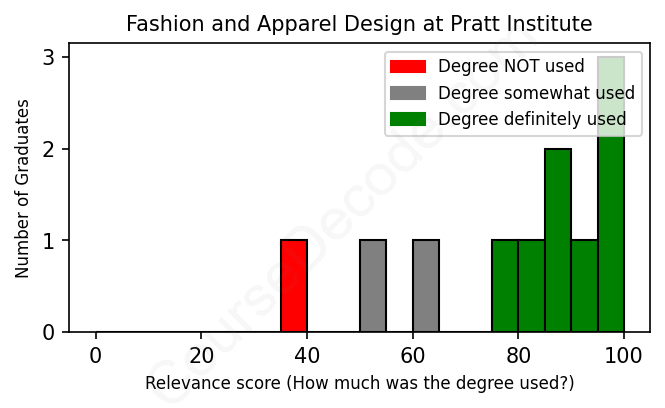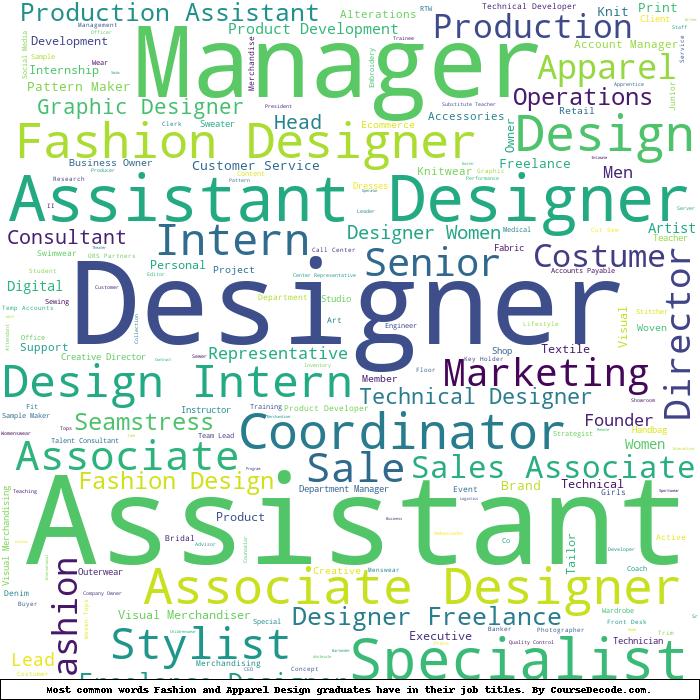
First, some facts. Of the Fashion and Apparel Design graduates from Pratt Institute we've analyzed , here's how many have used (or NOT used) their degree in their career:

These are estimates based on AI analysis of 11 LinkedIn profiles (see below).
The verdict? Significantly above average. Overall, with an average relevance score of 79%, Fashion and Apparel Design graduates from Pratt Institute have a much higher likelihood (+12%) of finding work in this field compared to the average graduate across all fields:
And for comparison, here's the chart for all profiles we've looked at across all degrees.
Also, after graduating, only 9% of these graduates have pursued further education other than another Bachelor's degree (such as a Masters degree or other), compared to the average across all profiles of 35%. This suggests a Bachelors degree is enough for most Fashion and Apparel Design graduates, and it's normal to look for work straight after graduation.
See the details:
|
Relevance score: 39% We think this person has NOT gone into a career related to their degree. We think this person has NOT gone into a career related to their degree.
DEGREE INFOGraduated in 2016 from Pratt Institute with a Bachelor of Fine Arts - BFA in Fashion and Apparel Design. No other secondary education since. JOB HISTORY SINCE GRADUATIONFifth Avenue Club Assistant Saks Fifth Avenue Jul 2016 - Sep 2017 Saks Associate  Salesfloor Aug 2016 - Sep 2017 Bridal Stylist  BHLDN / Anthropologie Weddings Nov 2017 - Aug 2018 Stylist  DVF (Diane von Furstenberg) Aug 2018 - Jan 2020 Wholesale Associate  Tory Burch Sep 2020 - Present ABOUTNo information provided. |
The top 10 most common jobs done by the graduates we've analyzed (ranked most common to least) are:
After checking out the LinkedIn profiles of Pratt Institute graduates in Fashion and Apparel Design, it seems like a good number of them have ventured into roles that are pretty directly tied to fashion. A lot of them have worked as designers, assistants, or in production and development positions, which totally makes sense since those kinds of jobs really lean on the skills they learned during their degree. Positions like Assistant Designer at Old Navy or Fabric Research & Product Development at Gabriela Hearst show that they're applying their design knowledge in ways that align closely with what they studied. Even internships at relevant companies help graduates gain valuable experience and make connections in the fashion industry.
However, not every job these grads landed was in the fashion design realm. Some have taken on roles in archiving or management that don't directly capitalize on their fashion skills, like being an Admissions Representative or Project Manager where the relevance to fashion design is quite limited. Many of those positions are valuable in their own right but don't tap into the creative design element that comes with their degree. So, while there's a strong theme of involvement in fashion-related roles, a fair number of graduates have also ended up in positions that, while interesting, aren't necessarily what you might think of when considering a career directly in fashion and apparel design.
Here is a visual representation of the most common words in job titles for Fashion and Apparel Design graduates (this is across all Fashion and Apparel Design graduates we've analyzed, not just those who went to Pratt Institute):

Graduates from the Fashion and Apparel Design program at Pratt Institute seem to embark on varied and interesting career paths, especially right after they finish their degree. Most of them kick off their careers in roles that emphasize hands-on experience, like internships, assistant positions, and initial job roles in production or design. For instance, many landed internships at well-known brands before moving into permanent positions, while others started in entry-level jobs that allowed them to build their skills and industry know-how. It looks like many graduates manage to find jobs relatively quickly, often in entry-level roles within fashion design, product development, and merchandising which are directly related to their studies.
Fast forward five to ten years, and you can see a mix of trajectories. Many seem to have moved up the ladder within the fashion industry, taking on roles as designers, managers, or even starting their own businesses. The alumni work for a range of reputable companies like Ralph Lauren, Tory Burch, and others, which reflects positively on their career growth. However, there’s also a good number who have taken different paths, such as teaching or exploring freelance opportunities, which might indicate a broader interpretation of a career in fashion beyond just traditional roles. Overall, the outcomes for Pratt Institute graduates in fashion and apparel design appear quite promising, with many carving out successful and relevant careers in the field.
Getting a Bachelor’s degree in Fashion and Apparel Design, especially at a place like Pratt Institute, can be pretty challenging but also super rewarding. The workload is often intense with lots of assignments, projects, and deadlines, plus you'll be spending a good amount of time perfecting your design skills and learning about textiles, marketing, and the business side of fashion. It's creative and fun, but you really have to be dedicated and passionate about it to keep up with the fast pace and the level of detail expected. So, while it might be easier than some engineering degrees, prepare yourself for late nights and a strong commitment if you want to thrive in such a competitive field!
Most commonly, in the LinkedIn profiles we've looked at, it takes people 4 years to finish a Bachelor degree in Fashion and Apparel Design.
So, looking at these Pratt Institute grads, it seems like they’ve had a mixed bag when it comes to making decent money in the fashion and apparel world. The earlier graduates, like the one who worked as an Archive Director and then for a big name like Ralph Lauren, likely earned a pretty solid salary, especially as they moved up the ranks. But then you see others, especially those right out of school or in internships, starting from the bottom, and they may not be pulling in big bucks yet. Like the recent grads who are still in roles like interns or assistants—those jobs definitely aren’t paying top dollar. Overall, it looks like some have carved out a good career path with decent earnings, but others are hustling to make ends meet in a competitive industry.
Here is a visual representation of the most common words seen in the "about" section of LinkedIn profiles who have a Bachelor degree in Fashion and Apparel Design (this is across all Fashion and Apparel Design graduates we've analyzed, not just those who went to Pratt Institute). This may or may not be useful:

Here are all colleges offering a Bachelor degree in Fashion and Apparel Design (ordered by the average relevance score of their Fashion and Apparel Design graduates, best to worst) where we have analyzed at least 10 of their graduates:
| College | Score | Count |
|---|---|---|
 Otis College of Art and Design Otis College of Art and Design
|
95 | 11 |
 Parsons School of Design Parsons School of Design
|
90 | 11 |
 Parsons School of Design - The New School Parsons School of Design - The New School
|
89 | 22 |
 Fashion Institute of Technology Fashion Institute of Technology
|
87 | 35 |
 Pratt Institute Pratt Institute
|
79 | 11 |
 Kent State University Kent State University
|
73 | 23 |
 Savannah College of Art and Design Savannah College of Art and Design
|
68 | 22 |
 The Art Institutes The Art Institutes
|
50 | 11 |